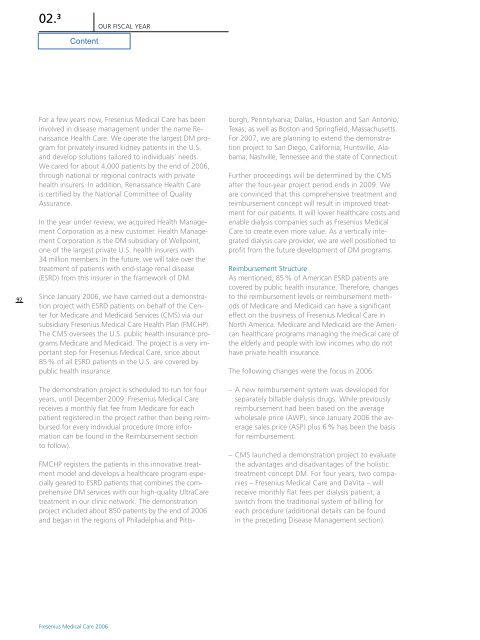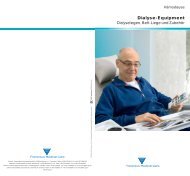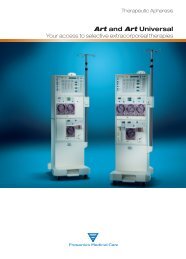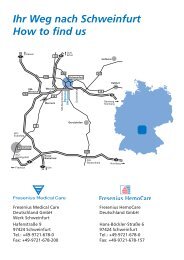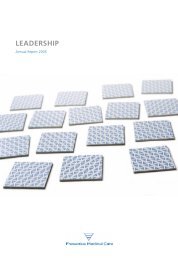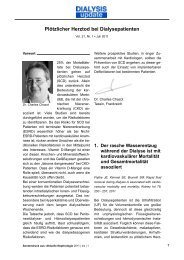Operations and Business Environment - Fresenius Medical Care
Operations and Business Environment - Fresenius Medical Care
Operations and Business Environment - Fresenius Medical Care
Create successful ePaper yourself
Turn your PDF publications into a flip-book with our unique Google optimized e-Paper software.
02. 3<br />
Our Fiscal year<br />
92<br />
For a few years now, <strong>Fresenius</strong> <strong>Medical</strong> <strong>Care</strong> has been<br />
involved in disease management under the name Renaissance<br />
Health <strong>Care</strong>. We operate the largest DM program<br />
for privately insured kidney patients in the U.S.<br />
<strong>and</strong> develop solutions tailored to individuals’ needs.<br />
We cared for about 4,000 patients by the end of 2006,<br />
through national or regional contracts with private<br />
health insurers. In addition, Renaissance Health <strong>Care</strong><br />
is certified by the National Committee of Quality<br />
Assurance.<br />
In the year under review, we acquired Health Management<br />
Corporation as a new customer. Health Management<br />
Corporation is the DM subsidiary of Wellpoint,<br />
one of the largest private U.S. health insurers with<br />
34 million members. In the future, we will take over the<br />
treatment of patients with end-stage renal disease<br />
(ESRD) from this insurer in the framework of DM.<br />
Since January 2006, we have carried out a demonstration<br />
project with ESRD patients on behalf of the Center<br />
for Medicare <strong>and</strong> Medicaid Services (CMS) via our<br />
subsidiary <strong>Fresenius</strong> <strong>Medical</strong> <strong>Care</strong> Health Plan (FMCHP).<br />
The CMS oversees the U.S. public health insurance programs<br />
Medicare <strong>and</strong> Medicaid. The project is a very important<br />
step for <strong>Fresenius</strong> <strong>Medical</strong> <strong>Care</strong>, since about<br />
85 % of all ESRD patients in the U.S. are covered by<br />
public health insurance.<br />
The demonstration project is scheduled to run for four<br />
years, until December 2009. <strong>Fresenius</strong> <strong>Medical</strong> <strong>Care</strong><br />
receives a monthly flat fee from Medicare for each<br />
patient registered in the project rather than being reimbursed<br />
for every individual procedure (more information<br />
can be found in the Reimbursement section<br />
to follow).<br />
FMCHP registers the patients in this innovative treatment<br />
model <strong>and</strong> develops a healthcare program especially<br />
geared to ESRD patients that combines the comprehensive<br />
DM services with our high-quality Ultra<strong>Care</strong><br />
treatment in our clinic network. The demonstration<br />
project included about 850 patients by the end of 2006<br />
<strong>and</strong> began in the regions of Philadelphia <strong>and</strong> Pittsburgh,<br />
Pennsylvania; Dallas, Houston <strong>and</strong> San Antonio,<br />
Texas; as well as Boston <strong>and</strong> Springfield, Massachusetts.<br />
For 2007, we are planning to extend the demonstration<br />
project to San Diego, California; Huntsville, Alabama;<br />
Nashville, Tennessee <strong>and</strong> the state of Connecticut.<br />
Further proceedings will be determined by the CMS<br />
after the four-year project period ends in 2009. We<br />
are convinced that this comprehensive treatment <strong>and</strong><br />
reimbursement concept will result in improved treatment<br />
for our patients. It will lower healthcare costs <strong>and</strong><br />
enable dialysis companies such as <strong>Fresenius</strong> <strong>Medical</strong><br />
<strong>Care</strong> to create even more value. As a vertically integrated<br />
dialysis care provider, we are well positioned to<br />
profit from the future development of DM programs.<br />
Reimbursement Structure<br />
As mentioned, 85 % of American ESRD patients are<br />
covered by public health insurance. Therefore, changes<br />
to the reimbursement levels or reimbursement methods<br />
of Medicare <strong>and</strong> Medicaid can have a significant<br />
effect on the business of <strong>Fresenius</strong> <strong>Medical</strong> <strong>Care</strong> in<br />
North America. Medicare <strong>and</strong> Medicaid are the American<br />
healthcare programs managing the medical care of<br />
the elderly <strong>and</strong> people with low incomes who do not<br />
have private health insurance.<br />
The following changes were the focus in 2006:<br />
– A new reimbursement system was developed for<br />
separately billable dialysis drugs. While previously<br />
reimbursement had been based on the average<br />
wholesale price (AWP), since January 2006 the average<br />
sales price (ASP) plus 6 % has been the basis<br />
for reimbursement.<br />
– CMS launched a demonstration project to evaluate<br />
the advantages <strong>and</strong> disadvantages of the holistic<br />
treatment concept DM. For four years, two companies<br />
– <strong>Fresenius</strong> <strong>Medical</strong> <strong>Care</strong> <strong>and</strong> DaVita – will<br />
receive monthly flat fees per dialysis patient, a<br />
switch from the traditional system of billing for<br />
each procedure (additional details can be found<br />
in the preceding Disease Management section).<br />
<strong>Fresenius</strong> <strong>Medical</strong> <strong>Care</strong> 2006


